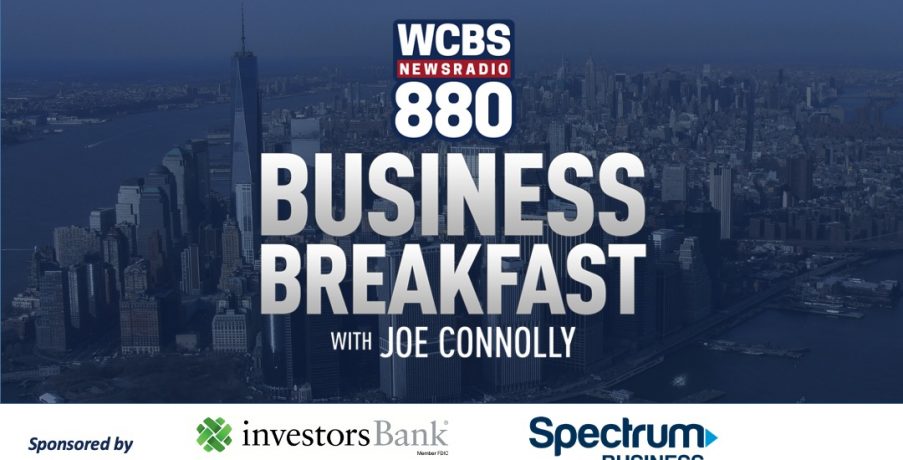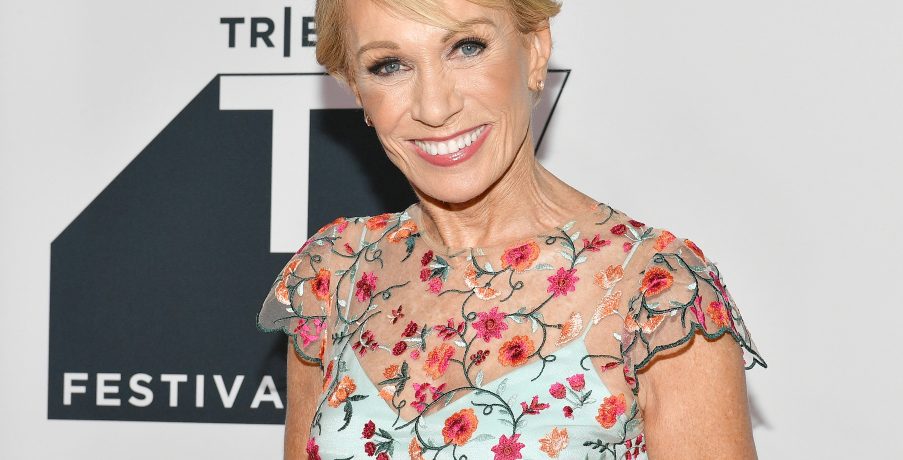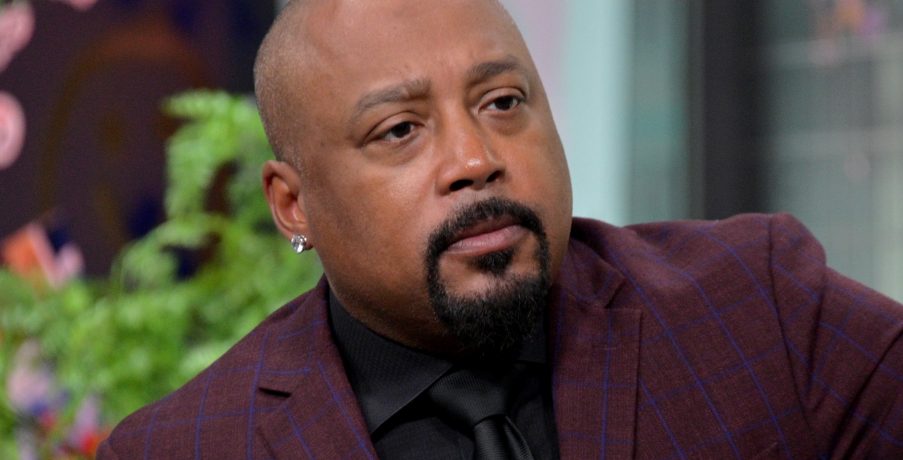
Neil A. Carousso produces NewsNation original “Kurt’s Country” – a celebration of country music and a slice of Americana with host Kurt Bardella.
-
WCBS Virtual Business Breakfast: Local Business Leaders Share Wisdom On Survival, Recovery
Posted by: Neil A. CaroussoPost Views: 1,083By Neil A. Carousso
NEW YORK (WCBS 880) — Three local pioneers have made pivots to stay afloat and support their communities during the coronavirus pandemic.
Cindi Bigelow, third generation owner of Bigelow Tea, Boxcar’s Joe Colangelo and Michael Bednark of Bednark Studio shared their experiences with WCBS 880 business reporter Joe Connolly on the first-ever WCBS Virtual Business Breakfast, sponsored by Investors Bank and Spectrum Business.
“I try to pride myself on thinking ahead,” said Bigelow, who was forced to adjust her Fairfield, Connecticut factory operations and implement new safety procedures. “I found myself, really, just operating as fast as I could to try to keep up with what else we needed to do to do it right at Bigelow and for our employees. It was hard. It was a lot of work.”
Cindi said that at the height of the COVID-19 crisis, health guidance changed so rapidly that she and her executive team updated procedures multiple times a day. While sales for tea surged, other areas of her business continue to suffer and safety for her employees remains the priority.
Colangelo’s commuter parking app business plummeted 100 percent; revenue dropped to $0. The U.S. Navy veteran who served in Afghanistan was forced to pivot into a new line of business.
“Talk to your customers on the phone. Just say, ‘Hey, can I grab you for fifteen minutes? I just want to hear what your problems are,'” the Boxcar founder said of how he developed four new services in New Jersey.
Today, Colangelo’s Cranford-based company offers grocery pick-up and delivery services, car detailing, outdoor pools and shows drive-in movies, which help boost its brand awareness.
“There may be these ways that you can solve their problems that you haven’t thought of, yet,” the Naval officer turned entrepreneur said.
Michael Bednark transformed his Brooklyn Navy Yard factory from designing and manufacturing displays for clients, including Saks Fifth Avenue, to becoming an essential business by making face shields and Personal Protective Equipment (PPE) for New York City hospital workers. They actually beat the largest face shield manufacturer, Bauer Hockey, to market.
“I don’t want to go into a completely new business, but something that’s not that far off of an iteration of my business,” Bednark explained to Connolly and the Virtual Business Breakfast panel.
He said his mentality at the outset of the coronavirus outbreak in New York in March was focused on how he can help to “serve those people with the team and the equipment that I have.”
Bednark added a new COVID-19 product line last month by making and installing plastic dividers in ride sharing drivers’ cars to prevent the spread of the virus.
“How did you want to act during this crisis?” reflected Colangelo. “Were you out there helping people, treating your counterparties, your partners fairly? Because, you will build up the best brand and that brand will be around for 30-40 years if you treat people fairly right now.”
The entrepreneurial spirit on the panel was palpable, punctuated by the drive to serve their customers, employees and business partners in an unprecedented health and economic crisis that is fueling uncertainty and stress.
“It’s just constantly reassessing and listening more and taking all your years of experience and just keep pushing that envelope and keep pushing that bar up,” Bigelow said, adding, “No matter what, just keep trying.”
Watch the WCBS Virtual Business Breakfast above to learn innovative ideas to survive and recover from the pandemic.
-
Week In Sound: Phase II and the Fight for Equal Rights
Posted by: Neil A. CaroussoPost Views: 843NEW YORK (WCBS 880) — Neil A. Carousso produced the week in sound as heard on WCBS Newsradio 880 for the week ending June 19, 2020. Hear it on the player below.
For the latest news in the New York Metropolitan Area and throughout the world, visit WCBS880.com.
-
Week In Sound: Reopening and Reform
Posted by: Neil A. CaroussoPost Views: 885NEW YORK (WCBS 880) — Neil A. Carousso produced the week in sound as heard on WCBS Newsradio 880 for the week ending June 12, 2020. Hear it on the player below.
For the latest news in the Tri-State Area and throughout the world, visit WCBS880.com.
-
Barbara Corcoran Told Her ‘Shark Tank’ Companies To Reinvent To Survive
Posted by: Neil A. CaroussoIn Best Of, Entertainment, Featured, Guest, Interview, Latest, News Stories, The World, Top News, videosPost Views: 879By Neil A. Carousso
NEW YORK(WCBS 880) — Real estate mogul Barbara Corcoran says 80 percent of the businesses she has invested in on “Shark Tank” will not survive the economic crisis caused by the coronavirus pandemic.
“The minute this problem started, I said, ‘Sit down and make a list of where every piece of your business comes from, and then, make, right next to it, a list of how you can replace it cause it ain’t going to be there anymore,'” Corcoran told Joe Connolly and Neil A. Carousso of her conversations with the owners of the roughly 80 businesses she bought stake in on the hit ABC reality television program.
Corcoran said on the WCBS Small Business Spotlight, sponsored by BNB Bank, that only a few owners took her seriously when she told them to incorporate a tight team of workers into making decisions on reinventing themselves. Those that did “hit the floor running.”
She said business owners who are persistent and tenacious in their approach are the “warriors” who will survive the recession. She also emphasized communication with customers while working to actively sell current and new products and services.
“I’ve never seen a new business survive if it’s not led by a salesman,” Corcoran said, adding, “If you can’t sell your way out of a pickle, you don’t have a chance.”
She said if an entrepreneur can demonstrate he or she is a master of selling themselves and their business on “Shark Tank,” she’ll “buy anything.”
But, Barbara explained that getting on the show is not a true test of success even though it’s an arduous vetting process.
“When I’m in business with someone three months, maybe four months the most, it’s when the crap hits the fan, what do they do about it? The minute they start blaming somebody else, I know they’re a victim, they’re never going to make it,” she said.
On the flip side, Corcoran told Connolly and Carousso that those owners who take responsibility and actively look for solutions, are the successful business leaders with whom she is making profits.
She also told WCBS 880 that the model for a successful entrepreneur is their track record as a person. Overcoming failure and obstacles in life is an indication to Corcoran that she should invest in the person’s business.
“When I can spot somebody who’s been injured with something to prove, they get a burn in their chest that’s going to make them succeed if they’re hard workers,” she remarked. “I’m looking for that hustler.”
Meanwhile, with tens of millions of Americans unemployed amid the COVID-19 outbreak and business shutdowns, Corcoran is seeing a sizable shift in the real estate market with people fleeing the City for suburbs in New Jersey and Connecticut. The Corcoran Group owner says employers see their employees working efficiently at home and will cut unnecessary brick and mortar costs. U.S. office vacancy will rise from 16.8 percent to 19.4 percent by year’s end, according to Moody’s Analytics REIS estimates. Corcoran sees that as good news for tenants who have taken negotiating power from landlords.
https://www.facebook.com/NeilACarousso/videos/705347700029920/
“The value per foot has got to drop substantially for the landlord to attract tenants and he’s going to have to become a salesman,” she said.
But, Barbara is bullish on the Big Apple.
“I have such confidence in the City. I have no doubt that the City will chug like it always does. We’re just going to hesitate and push forward,” Corcoran, who has lived in New York since she was 22 years old, said, punctuating, “I think it may recover faster than we think.”
She remembers seeing how the country rallied around New York City after the September 11, 2001 terrorist attacks and the “love” Americans displayed while embracing their fellow countrymen and women. She recalled she told her Corcoran Group sales team the real estate market would get “hot within 6 months” and it did with a new crop of buyers.
“I had that deep faith that the City always recovers,” said Corcoran.
Hear innovative and actionable ideas from Barbara Corcoran for business survival with examples from “Shark Tank” on the WCBS Small Business Spotlight Podcast on the RADIO.COM app or on the media player above.
-
‘Shark Tank’ Star Daymond John Reveals Creative Business Solutions To Survive Coronavirus Pandemic
Posted by: Neil A. CaroussoIn Best Of, Entertainment, Featured, Guest, Interview, Latest, News Stories, Technology, The World, Top News, videosPost Views: 925By Neil A. Carousso
NEW YORK (WCBS 880) – Entrepreneur Daymond John, an investor on ABC’s “Shark Tank,” is encouraging his businesses to think outside the box to survive the economic crisis caused by the COVID-19 outbreak.
“Once you know what you have with your staff and what you have with your inventory, find out who else out there you can collaborate with,” John told Joe Connolly and Neil A. Carousso on the WCBS Small Business Spotlight focusing on small business survival, sponsored by BNB Bank.
The FUBU founder and bestselling author of “Power Shift: Transform Any Situation, Close Any Deal and Achieve any Outcome” pointed to Cowboy Fitness, based in Utah and Colorado, which he invested in on season 4 of “Shark Tank,” as an example of how business owners should pivot.
“They basically loaned (their members) the equipment, and then, now, he does video conferences, kind of like a Peloton,” John said, adding that Cowboy Fitness retained most of its members by creating a new service.
They have also secured partnerships with local stores that are shuttered and suffering from the lack of foot traffic. The retailers sell athletic apparel to its gym members at a 30 percent discount. In turn, Cowboy Fitness earns 5 percent on each sale. John calls this a “win-win” solution.
The 51-year-old businessman says technological advancements have been implemented much faster because of the coronavirus pandemic, forcing companies to develop new efficiencies and work-from-home policies. The fashion brand expert says traditional retail will not be able to bounce back without making vast changes to its business model.
“If I had Macy’s, one of the most famous and iconic retailers in the world, I would have cameras in there that are showing people’s style or various other things that people can feel like they can go in there because they’re an influencer,” John said, emphasizing, “They have to really make sure they become more of an events space than anything else.”
At The Shark Group, which he founded in 2009, John advises businesses on product awareness and developing genuine, innovative approaches to grow brands. One of the companies he works with is Bombas, a sock company founded by Dave Heath, whose core mission is to donate one pair of socks to the homeless community for every pair bought.
.@TheSharkDaymond tells @JoeConnollybiz and me he looks to invest in companies on @ABCSharkTank that “add value” to the communities they serve like @BOMBAS. #SharkTank #branding
More with Daymond on the @WCBS880 Small Business Spotlight Podcast: https://t.co/oYPQxdqcka pic.twitter.com/w2mCxr2vUj
— Neil A. Carousso (@NeilACarousso) May 13, 2020
“The millennials today, and people today, they want to say I didn’t give one time at the end of the year, I gave 400 times,” John explained. “How do you find ways to add more value to the person and barter in your deals?”
That’s what he is looking for on “Shark Tank:” Companies that are not only making money, but also demonstrate authenticity and passion for the communities they serve.
“I’m trying to find out if I like the entrepreneur personally, if I feel that I could communicate with them, I could add value to them, they’re a problem solver not a problem creator and whether this business works out or not, we’ll do another business together,” he said.
John took Connolly and Carousso behind the scenes of the reality TV show, telling WCBS 880 that the Sharks are competitive and the negotiating among the millionaires and billionaires is “real.”
“You don’t want to get embarrassed on national television by Mark Cuban or Barbara (Corcoran) beating you out in front of everybody,” John said.
He revealed “Shark Tank” pitches can last up to two hours, but viewers only see 8 minutes. Finalizing deals can last months after the taping as the Sharks vet businesses carefully before writing a check out of their own bank accounts.
When asked if he believes entrepreneurs are born or made, the Queens native said it’s “instinct,” elaborating that people are often discouraged from starting their own businesses because of difficulty or the dismissive attitude that it’s “never been done before.” But, John had already started a few businesses before he was 18 when he launched FUBU, now worth about $400 million, out of his home in Hollis.
While driving around Queens, his mother, Margot, encouraged him to follow his dreams. She said, as John recalled, “Every single thing around here started with one person that had one idea that took one action. Why can that not be you?”
“I started by selling hats on the corner in 1989 and I had sold $800 worth of hats in one hour,” he said of his first designed ski caps that he made by hand. “I just had to sow a straight line to really figure out how to make these hats.”
He closed that business three times between 1989 and 1992 because he ran out of money. But, his shirts became popular, in part, because he loaned them to local artists on the rise who wore FUBU T-shirts in music videos.
John’s mother took him to trade shows around the country where he earned hundreds of thousands of dollars in sales. But, he needed inventory. As an inexperienced young businessman, he was unable to secure a loan from a bank, so Margot took out a $100,000 loan on her house that John said was only worth $75,000.
“I sell all the furniture in my house, move in industrial sowing machines, sleep in sleeping bags next to the sowing machines,” he said of his hustle.
He also worked at Red Lobster at night to make money to invest into his dream clothing business that he operated during the day.
John said he bought an advertisement in The New York Times or New York Daily News seeking investors to provide the funding he needed to fill orders and move FUBU out of his home in Hollis.
“Thirty-three people called. 30 of them were loan sharks or Kevin O’Leary-type of people,” his fellow “Shark Tank” star quipped. “One of them was Samsung’s textile division.”
They signed a deal for Samsung to take over manufacturing, reducing costs, and John learned a lesson in business he would later impart on others while living the American Dream.










